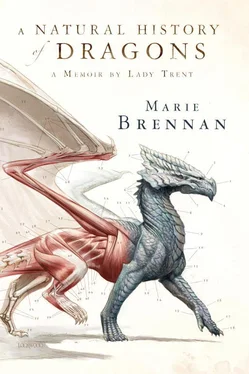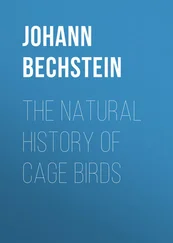At the time, this seemed a sorry replacement for my grand adventures, which were (I thought) over for good. With the wisdom of age, though, I have come to be grateful for the fruit of those grey years. They honed my eye and taught me to keep notes on what I saw: two skills which have formed the basis of all my accomplishments since.
For all that, though, they were two very dull, very tedious years.
Their end came with my sixteenth birthday, and my official transition from “girl” to “young woman.” Mama therefore looked to my future—or rather I should say, put into action the plans she had been forming since I was born. She had great ambitions for my marriage: Sir Daniel Hendemore’s only daughter should not wed any of the gentlemen in the Tam River Valley, but go to Falchester and make her debut in Society, where she might attract the eye of someone very fine indeed.
My patience with martyrdom would not have extended quite so far as to endure this peaceably, were it not for a startling conversation I had with my father shortly before I was to be dragged to Falchester.
We had this encounter in his study, where I trained my eyes away from the shelves with their old, forbidden friends. My father leaned back in his chair and steepled his fingers before him.
“It is not my intention,” he said, “to force you into unhappiness, Isabella.”
“I know that, Papa,” I replied: the picture of daughterly demureness.
Perhaps a smile quirked his mouth inside its beard; perhaps I simply imagined it. “You do that very well,” he said, index fingers tap-tapping against each other. “Indeed, you’ve become quite a credit to us, Isabella. I know these years have not been easy on you, though.”
To this I did not respond, having nothing ladylike to say. I valued his approval too much to cast it aside.
After a pause, he said, “Matchmakers have gone out of fashion these days; we seem to think we can do better without professional aid. But I have taken the liberty of paying one to assemble a small list, which you will find on the table at your side.”
Mystified, I found the paper and unfolded it, revealing six names.
“A husband willing to fund a library for his bookish wife is not so easy to obtain; most would see it as a pointless expense. You might, however, find one willing to share his library. The gentlemen on that list are all amateur scholars, with well-stocked studies.” Papa’s eyes gleamed at me from beneath his brows, and the lines around them threatened to crinkle up. “I have it on good authority that the ones I have underlined possess copies of A Natural History of Dragons. ”
As I had not allowed myself to think that name for two years, it struck me with roughly the same force I imagine accompanies the name of a girlhood love, not seen for ages. For a moment, I understood Manda and her sensational novels.
Before I succeeded in finding words, Papa went on. “I have not secured any of them for you; that task remains for you and your mother, who would not thank me for my interference. They are all eligible, however, and should you snare one, I promise my consent.”
He rose from his chair in time to catch me as I came flying around his desk to envelop him in a hug. A laugh of startled delight won its way free of me. After our conversation in my sitting room, I had demoted my father from minor pagan god to well-meaning ogre—but it seemed that my dutiful efforts these two years past had paid dividends.
Six names. Surely one of them would bring me joy.
The hunt for spouses is an activity on a par with fox-hunting or hawking, though the weapons and dramatis personae differ. Just as grizzled old men know the habits of hares and quail, so do elegant society gossips know every titbit about the year’s eligible men and women. Horses feature in both pursuits: in one as modes of transportation, and in the other as means of display. The fields and forests of the countryside are changed out for drawing rooms, ballrooms, and every other sort of room where a social event might be arranged and the eye of a potential spouse might be caught.
So did Society descend upon Falchester, and the horns sounded the beginning of the hunt.
Gossip about such matters ages badly; who said what to whom and where is swiftly forgotten, replaced by fresher meat. At my advanced years, such minutiae of my youth rank somewhere between the Gostershire tax rolls and the complaints of one’s hypochondriac great-aunt for their interest to the modern audience. I shall trouble you only with the part that had lasting effect, which is the day I went to the king’s menagerie.
I was not supposed to go. Mama’s scrupulous plans called for me to be seen riding in the park that afternoon; she intended to make a virtue of my country upbringing, by displaying my skill in the saddle. But she, poor woman, had come down with a stomach ailment (I suspect bad fish at Renwick’s the night before), and could not accompany me.
By a stroke of luck, Andrew was in town at the time, and came by to discharge his filial duty by commiserating with our mother. He was not yet hunting a wife; at that time he was idling his way through university, changing his mind every other week as to whether he would prefer to join the army and shoot at people in foreign places. But he was still my best ally among my brothers, and so when Mama fretted about the disruption of her plans, he offered to be my escort for the day.
She did not consider this ideal—he might be mistaken for a suitor of mine, by those who did not know him—but I had no other chaperon arranged. (Amanda, who had come out and promptly wed the previous year, was housebound by the expectation of her first child, and could not be there to assist.) Andrew’s offer was better than my wasting the time at home, and so she agreed, with reluctance.
Andrew caught my arm as soon as we were away from her door. “Don’t put on riding clothes,” he said, sotto voce . “We’re going to the menagerie.”
I blinked at him, surprised but not uncooperative. I enjoyed riding, but out in the countryside; trotting around the park in boring circles held little appeal. “But we shan’t get in.”
“Yes, we shall,” he said, his eye gleaming with conspiratorial pleasure. “The Countess of Granby has arranged for the tour, and I am permitted a guest.”
I knew little of the menagerie, except that the king’s late father had established it on spacious grounds downstream from Falchester, and the son had spared no expense to see it stocked with every exotic creature that could be persuaded to survive in captivity. It existed primarily for the entertainment of the royal family, with occasional public days, which I, growing up in rural Tamshire, had no chance to experience. As Andrew could well guess, a tour would be a rare treat for me.
Our guide was Mr. Swargin, the king’s naturalist. Under his direction, the menagerie was organized according to broad type: birds in one place, mammals in another, reptiles in a third, and so on. Stuffed and mounted specimens of those creatures that had passed on stood alongside the cages of those that still lived. The king possessed parrots, platypi, and piranhas; cuckoos, camels, and chameleons. I attempted to restrain my enthusiasm; learning is an admirable thing, in women as well as men, but only when it is of the right kind. (That is, of course, society’s opinion; not my own. I am glad to say it has changed somewhat since my day.) As a young lady, I should show interest only in songbirds and other such dainty creatures, lest I brand myself as ink-nosed.
The tour was disappointing in its organization, for people wandered in and out of the various gardens and glass-walled rooms, few paying even the slightest attention to Mr. Swargin’s speeches. I wished very much to listen to him, but didn’t dare single myself out by being the only one to attend to his words, and so I caught only snatches before we stopped before a pair of very grand doors.
Читать дальше












